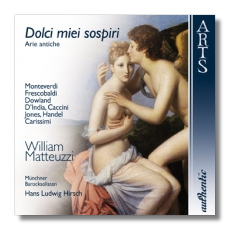
The Internet's Premier Classical Music Source
Related Links
-
Dowland Reviews
Frescobaldi Reviews
Handel Reviews
Monteverdi Reviews - Latest Reviews
- More Reviews
-
By Composer
-
Collections
DVD & Blu-ray
Books
Concert Reviews
Articles/Interviews
Software
Audio
Search Amazon
Recommended Links
Site News
 CD Review
CD Review
Dolci Miei Sospiri – Arie Antiche

- Claudio Monteverdi:
- "Scherzi musicali"
- Damigella tutta bella
- Dolci miei sospiri
- Quando l'alba in oriente
- "Selva morale e spirituale" #4 Confitebor tibi Domine
- Giacomo Carissmi: Apritevi inferni
- George Frideric Handel: Mi palpita il cor, HWV 132
- Girolamo Frescobaldi:
- "Primo Libro d'Arie Musicali per cantarsi" - Entro nave dorata
- "Secondo Libro d'Arie Musicali per cantarsi" - O mio cor
- Giulio Caccini:
- "Le Nuove musiche" - Amarilli mia bella
- "Nuove musiche e nuova maniera di scriverle" - Dite o del foco mio
- John Dowland:
- "a Musical Banquet" - In Darkness let me dwell
- "First Booke of Songs"
- # 4 If my complaints
- # 9 Go crystal tears
- #14 Come again, sweet love
- Robert Jones: "a Musical Dreame" - Ite caldi sospiri
- Sigismondo D'India:
- "Le Musiche… da cantar solo nel Clavicordo… et altri istromenti simili"
- Apertamente dice la gente
- Piangono al pianger mio
William Matteuzzi, tenor
Hubert Hoffmann, archlute
Hans Ludwig Hirsch, harpsichord
Münchner Barocksolisten
Arts 47711-2 DDD 72:29
In some ways, this CD is something of a throwback to the "old days" when singers sang the Baroque and pre-Baroque repertoires more operatically than they do today. In the 1950s, it was not unheard of for a singer to appear in an opera by Verdi one night, and in another by Monteverdi (albeit usually in a corrupt edition) less than a week later. Generally, the singer made little effort to modify his style as he moved between the two operas, and the result, while full-blooded, was far removed from any sort of stylistic authenticity. On the other hand, there was nothing bland about Franco Corelli singing Handel's Hercules, or Giuseppe di Stefano in Monteverdi's L'Incoronazione di Poppea. Some of today's more pallid marvels of authenticity should listen to these odd matches of singer and song, not just for negative examples, but for positive ones as well.
Fortunately, William Matteuzzi is a smart singer, and he knows the difference between right and wrong. He debuted in 1979, and has been associated mostly with music from the bel canto era, particularly operas by Rossini. He can sing several notes above a high C with seemingly little effort, and he can negotiate Rossini's fiorature with reasonable facility. One would think that those skills would be of little use in a program of arie antiche - John Dowland is not the same as Rossini, after all – but Matteuzzi finds himself closer to home than he may have thought on this CD. As a result, he pulls this program off quite handsomely.
Matteuzzi sings these selections robustly, making no attempt to hide the appealing Italianate warmth of his voice. When needed, there's tenderness aplenty, but Matteuzzi's singing never becomes effete. It is a revelation to hear the four songs by Dowland ("In Darkness let me dwell," "Come again, sweet love," "If my complaints," and "Go crystal tears") sung with such a rich voice and so much passion. His accented English only adds to the music's charms, in my opinion. Another attraction of this CD is the closing selection, "Apritevi inferni" by Giacomo Carissimi, which Matteuzzi sings with appropriate vehemence, even rage, all the while keeping a firm grasp over the florid writing, and ending with a brilliant high note! We really get the best of both worlds here.
Matteuzzi is stylishly accompanied by Hoffmann in many of the selections, and Hirsch, conducting from the harpsichord, also makes his presence known. Again, there's no reticence, just a desire to put the music forward as positively and passionately as possible. I don't think this CD will please everyone, but I think it will turn the heads of those who think most 17th-century music is dull.
I also like the engineering, which surrounds the voice and the instruments with palpable room ambience. (In this case, the "room" is the Alte Evangelische Kirche am Ammersee in Germany.) The booklet includes sung texts, but no translations of the same.
Copyright © 2006, Raymond Tuttle




















